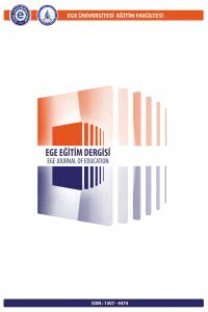Öğretmen Görüşlerine Göre Öğrencilerin Matematik Dersine Yönelik Tutumlarını Etkileyen Faktörlerin Ölçeklenmesi Çalışması
Bu araştırmada öğretmen görüşlerine göre öğrencilerin matematik dersine yönelik tutumlarını etkileyen faktörler ikili karşılaştırma yöntemiyle ölçeklenmiştir Araştırmanın verileri 2011 2012 eğitim öğretim yılında Türkiye’nin çeşitli yerlerinde görev yapan 243 öğretmenden toplanmıştır Araştırmada öğretmen görüşlerine göre öğrencilerin matematik dersine yönelik tutumlarını en çok etkileyen faktörün öğretmenin dersini öğrenciye sevdirebilmesi olduğu bulgusuna ulaşılmıştır Öğretmen görüşleri cinsiyet kıdem ve branş bağımsız değişkenlerine göre ele alındığında ise kıdemi 6 10 yıl arasında olan öğretmenler ile ilköğretim matematik öğretmenleri hariç tüm kategorilerde ilk sıradaki faktörün yine öğretmenin dersini öğrenciye sevdirebilmesi faktörü olduğu görülmektedir Öğrencilerin matematik dersine yönelik tutumlarını en az etkileyen faktörün ise matematikte kaygı faktörü olduğu bulgusuna ulaşılmıştır Bu bulgu kıdem değişkenine ilişkin 1 5 yıl kategorisi ve branş değişkenine ilişkin ilköğretim matematik öğretmeni kategorisi dışında bağımsız değişkenlerin bütün kategorileri için aynıdır
Anahtar Kelimeler:
matematik dersine yönelik tutum, ölçekleme, ikili karşılaştırma yöntemi
A Scaling Study For The Factors Affect The Attitudes Of Students Towards Maths Lesson According To The Views Of Teachers
In this study, the factors affect the attitudes of students towards maths lesson according to the views of teachers scaled by Paire – Wise Comparison Method. The data of the study were gathered from 243 teachers who are serving in various parts of Türkiye in the academic year of 2011-2012. In the study, according to the teachers’ opinions, it has been concluded that the most influential factor of students’ attitudes towards maths lesson is the teachers’ ability to have the maths lesson liked by students. When the teachers’ opinions have been approched according to the independent variables as gender, seniority and branch; and except for the maths teachers who have seniority between 6-10 years and who are at elemantary schools, the first factor in all other categories has been concluded as the teachers’ ability to have the maths less on liked by students again. The least factor that affects the students’attitudes towards maths has been found as the maths anxiety. This finding is the same for all the categories of independent variables except for the category of maths teachers at elemantary schools for the branch variable and for the categoryof the variable for teachers who have 1-5 years of seniority.
___
- Anıl, D. ve Güler, N. (2006). İkili karşılaştırma yöntemiyle ölçekleme çalışmasına bir örnek. Hacettepe Üniversitesi Eğitim Fakültesi Dergisi,30,30
- Atnafu, M. (November, 2010). Relation between tenth grade students’ attitude and components of attitude in algebra with algebra achievement of addis ababa secondary schools, Ethiopia. International Journal for Mathematics Teaching and Learning.
- Web: http://www.cimt.plymouth.ac.uk/journal/atnafu.pdf (İnternetten 13.11.2011 tarihinde elde edilmiştir.)
- Başer, N. ve Yavuz, G. (2003). Öğretmen adaylarının matematik dersine yönelik tutumları. Matematikçiler Derneği Bilim Köşesi. Web:http://www.matder.org.tr/bilim/oamdyt.asp?ID=11. (İnternetten 2011 tarihinde elde edilmiştir.)
- Dawson, C. (2000). Upper primary boys’ and girls’ interests in science: Have they changed since 1980? International Journal of Science Education, 22(6), 557-570.
- Hannula, M.S. (2002). Attitude towards mathematics: emotions, expectations and values. Educational Studies in Mathematics, 49(1), 25-46
- Kan, A ve Akbaş, A.(2005). Lise öğrencilerinin kimya dersine yönelik tutum ölçeği geliştirme çabası. Mersin Üniversitesi Eğitim Fakültesi Dergisi, 1(2), 227-2
- Karasar, N. (2008). Bilimsel Araştırma Yöntemi (18. Baskı).Ankara: Nobel Yayın Dağıtım
- Ma, X. (1999). A meta-analysis of the relationship between anxiety toward mathematics and achievement in mathematics. Journal for Research in Mathematics Education, 30(5), 520-540
- Ma, X. Ve Melntyre, L.J. (2005). Differential effects of mathematics courses on mathematics achievement. Canadian Journal of Education, 28(4), 827-852. Nazlıçiçek, E ve Erktin; E.(2002). İlköğretim matematik öğretmenleri için kısaltılmış matematik tutum ölçeği. Web: http://www.fedu.metu.edu.tr/ufbmek5/b_kitabi/pdf/matematik /poster/t194.pdf (İnternetten 13.11.2011 tarihinde elde edilmiştir.)
- Özçelik, D.A. (1998). Ölçme ve Değerlendirme. Ankara: ÖSYM Yayınları.
- Özgün-Koca, S.A ve Şen A.İ.(2006). Ortaöğretim öğrencilerinin matematik ve fen derslerine yönelik olumsuz tutumlarının nedenleri. Eurasian Journal of Educational Research, 23, 137-147.
- Tavşancıl, E. (2006). Tutumların Ölçülmesi ve SPSS Veri Analizi. Ankara: Nobel Yayınları.
- Tezbaşaran, A. (1997). Likert Tipi Ölçek Geliştirme Kılavuzu (2. Baskı). Ankara: Türk Psikologlar Derneği Yayınları
- Thurstone, L. L. (1927). A Law of Comparative Judgment. Psychological Review, 34, 273-286.
- Tobias, S. (1993). Overcoming math anxiety. New York: W. W. Norton & Company.
- Tocci, C.M. ve Engelhard, G. (1991). Achievement, parental support and gender differences in attitudes toward mathematics. Journal of Educational Research, 84(5), 280-286
- Turgut, F. ve Baykul, Y.(1992). Ölçekleme Teknikleri.Ankara:ÖSYM Yayınları.
- Yıldız, S ve Turanlı, N. (2010). Öğrenci seçme sınavına hazırlanan öğrencilerin matematiğe yönelik tutumlarının belirlenmesi.Selçuk Üniversitesi Ahmet Keleşoğlu Eğitim Fakültesi Dergisi, 30, 361-377.
- Wilkins, J. L. M. ve Ma, X. (2003). Modeling change in student attitude toward and beliefs about mathematics. Journal of Educational Research, 97(1), 526
- Yücel, Z. ve Koç, M.(2011). İlköğretim öğrencilerinin matematik dersine karşı tutumlarının başarı düzeylerini yordama gücü ile cinsiyet arasındaki ilişki. Elementary Education Online, 10(1), 133-143,.
- Zan, R ve Martino, P.D. (2007). Attitude toward mathematics: overcoming the positive/negative dichotomy. The Montana Mathematics Enthusiast.Web: http://www.math.umt.edu/tmme/monograph3/(İnternetten 13.11.2011 tarihinde elde edilmiştir.)
- ISSN: 1307-4474
- Yayın Aralığı: Yılda 3 Sayı
- Başlangıç: 2001
- Yayıncı: Ege Üniversitesi Eğitim Fakültesi
Sayıdaki Diğer Makaleler
Dil Edinimi ve Dil Öğrenimi Olgusuna Beyin ve Dil Gelişimi Açısından Bir Bakış
Müziğin Toplumsal ve Göstergebilimsel Temelleri
Önal SAYIN, Göknur BOSTANCI EGE
Tahsin Oğuz BAŞOKÇU, Tuncay ÖĞRETMEN
Öğretim Elemanlarının Geleneksel ve Çağdaş Ölçme Değerlendirme Yaklaşımlarının İncelenmesi
